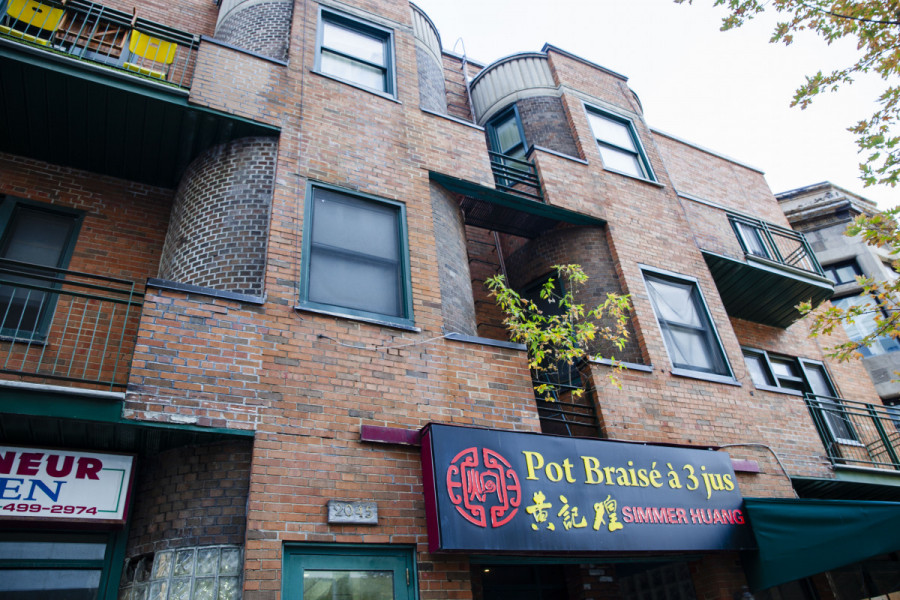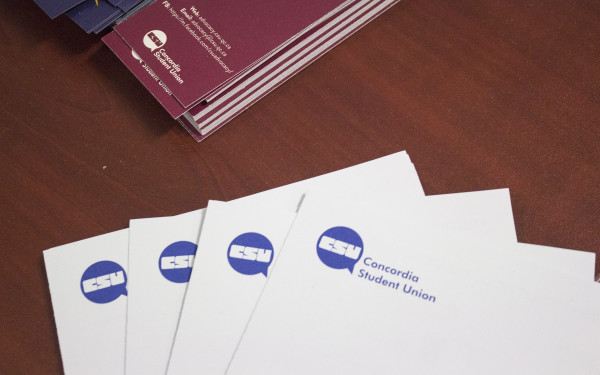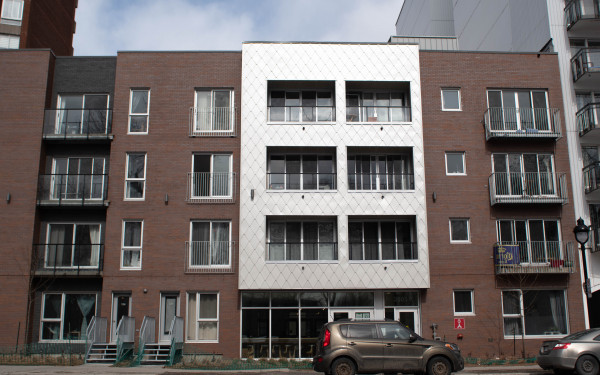CSU student centre to begin renovation in September 2024
The $5.5 million multi-purpose building is already serving students in need
After twenty years on the drawing board, the Concordia Student Union (CSU) plans to start work on a new student centre. Renovations will begin on Bishop Street this time next year.
In May 2022, the CSU purchased a building that will house the centre for approximately $5.5 million. Renovations are projected to cost another $5 million. The purchase funds were taken out of CSU’s Student Space, Accessible Education, and Legal Contingency (SSAELC) fund. Work is slated to be finished by September 2026, four years after the building’s initial purchase.
The building is three storeys high, with commercial spaces occupying the bottom floor and 12 apartments on the upper floors. According to CSU General Coordinator Harley Martin, it will house the on-campus fee levy group Le Frigo Vert, two student mental health services, CSU offices, and other multi-purpose rooms and study spaces. The building will be open to all students and will be completely owned and operated by the union.
The plan for the top two floors, the building’s residential area, is a bit more complex. Of the twelve apartments that occupy the space, two currently have tenants. Rather than let them sit empty, the CSU has enacted a transitional housing pilot project that makes use of the remaining apartments.
This project, spearheaded by CSU Sustainability Coordinator Maria Chitoroaga and the Housing and Job Resource Centre (HOJO), provides temporary rent-free housing for students in need. Five units are currently in use: two are managed by the Refugee Centre, while the other three are managed by the CSU.
According to Chitoroaga, the CSU has provided temporary placement for six unhoused students since the apartments were finished in July. The sustainability coordinator’s office employs a housing director who works with HOJO to meet with unhoused students and determine if they are a good fit for the program.
“The way we choose our tenants is based on urgency,” Chitoroaga said.
If a student needs housing immediately and there is an apartment available, then they are offered a place to stay. If all the apartments are full or the situation may be remedied without offering housing, then the housing director continues to meet with them and offer legal, personal, or job-related help.
The program is set to end on Nov. 2, at which point any students still living in the building will have to move out. Chitoroaga suggested that she may look into the possibility of extending the program until renovations start in September 2024, but this is dependent on funding.
The budget for this year’s housing project came out of the Sustainability Initiatives Budget Line, which she has had to increase via the CSU council. As that budget grows tighter, however, extending the project will depend on a large grant from the government or Concordia itself.
As for the future of transitional housing initiatives at Concordia, Chitoroaga was definitive. “It’s looking like we’ll start working on something permanent,” she said.
The remaining building space will serve as the headquarters for two mental health services that are open to Concordia students. These services, which are funded by a fee levy passed by a student referendum two years ago, have been in the works for the last two CSU mandates. One office will belong to Mosaic, a mental health service operating out of the Refugee Centre that the CSU has signed for a five-year contract. The other will belong to Black Mental Health Connections, an initiative with no current office designed to provide mental health services for members of the BIPOC community.
The second floor will also house study spaces that will be both public and bookable. Similarly, the third floor will consist mostly of study spaces, as well as a large multi-purpose room with audio-visual equipment. The roof will also be accessible as a multi-purpose event space in the warmer months.
Finalizing plans for the building may be more tricky than it seems. According to Le Frigo Vert member Hunter Cubitt-Cooke, the guarantees made to them by last year’s CSU mandate have not been passed on to this year’s council.
“It’s currently a bit up in the air whether [the space] is still going to work for us or not,” said Cubitt-Cooke. Last year’s mandate guaranteed them plenty of space to house Le Frigo Vert’s grocery and cafe, as well as control of the first-floor lounge space to use for their programming. Yet, this year, they were told that Le Frigo Vert’s ownership of the lounge had yet to be approved by the CSU council.
“We’re concerned if it stays a CSU lounge, what if it becomes a hostile CSU?” Cubitt-Cooke said. “Or even just a CSU that decides they want to do something else with the space, and then we lose our lounge access?” For Le Frigo Vert, their lounge space is a huge part of what they do as an organization. Cubitt-Cooke said that without it, their move to the new building might not happen.
All is not yet lost, though. “We’re hopeful,” Cubitt-Cooke said. “All in all, it’s still really exciting. It seems like a really awesome project, and I hope it works out with Frigo there.”
This article originally appeared in Volume 44, Issue 3, published October 3, 2023.




__600_375_90_s_c1.jpg)


_600_375_90_s_c1.jpg)